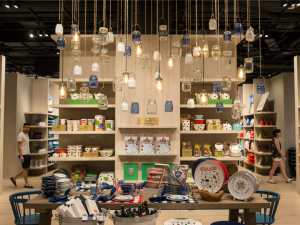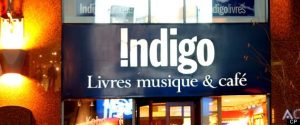After reading Adrien Rebselj’s blog post “Indigo Books & Music: Staying on Top” about how Indigo keeps surviving from the decreasing book sales in the whole bookstore industry, here are some thoughts that I would like to talk about.
In Adrien’s opinions, Indigo remains its flourish by expanding the scale to a retailer from “just a bookstore” as well as selling the Kobo e-reader patent to a Japanese company before the e-books market started shrinking. Besides, Adrien mentioned that indigo keeps analyzing and improving their product lines could make the company follow the changeable trend in book sales.

Picture from http://wpmedia.business.financialpost.com/2016/05/indigo-2.png?w=940&h=705
From my perspectives, I agree with Adrien’s thoughts. Indigo Books & Music has turned their book sales only model to a model called “Cultural Department Store”, which is expanding their product branches to home decoration, electronics, toys, fashions and body cares. It is a sustainable competitive advantage and makes Indigo differentiate its position from a bookstore to a retail store. This strategy has helped the company achieve more profits while other bookstores in the industry are suffering from the declining revenues. According to an article from Financial Post, lifestyle products are currently count 30% of Indigo’s sales, which is a huge success. Besides, Indigo are now cooperating with cafés company like Starbucks to set a café in each physical store. This POD (Point of Difference) of setting in-store cafés could make the company either gain more sales or receive rents. People enjoy handing a book sitting in a café and spend their spare time for the whole afternoon. Thus, Indigo could easily win the market by following these two strategies and survive from the stagnant book sale industry.

Moreover, Indigo sold its Kobo e-reader patent to a Japanese company in 2011 at a considerable value of $315 million when the e-reader market have not been shrinking. This action reveals the Rita McGrath’s Transient Advantage to some extent as Indigo seize the opportunity to sell their e-reader rights before it lose popularity. Besides, the company are considering expanding their warehouse capability to sell more books. According to their marketing department quantitative research, individuals who used to read 80% digitally are now turning back to read more physical books. Indigo saw the opportunity and is willing to change their business scale.
The way that Indigo Books & Music analyzing and improving their strategies allows the company to achieve a sustainable growth and easily survived from the weak book sale market. I would expect the company make more achievements in the future.
Word Count: 417